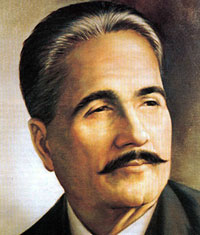By Dr. Ali Al-Ghamdi
Apr 27, 2016

Dr. Allama Muhammad Iqbal
Poets and members of the Muslim community from the Indian subcontinent as well as from across the Muslim world recently observed the death anniversary of the world-renowned Muslim poet and philosopher Dr. Allama Muhammad Iqbal. He was acclaimed as an inspiring poet, prominent philosopher, and farsighted Muslim leader. Iqbal was widely known as the “Poet of the East” and the “Philosopher of Islam”.
The poems of Allama Iqbal, which have been translated into a large number of languages, are regarded as refined literary works that foster moral values and address the problems of the Muslim Ummah. He sang about the glorious past of the Ummah and created momentum for building a radiant future for it.
Perhaps, the most popular among these poems, loved by all sections of Arab society, is the poem titled “Shikwa Jawab e Shikwa.” It is considered one of the world’s most beautiful poems. The poem was translated into Arabic by the famous Egyptian poet Al-Sawi Shaalan. Noted Arab musician Riyad Al-Sunbati composed a song from this poem entitled “Hadeeth Arrouh” (the talk of the soul), which was sung by the renowned Egyptian singer Umm Kulthum. The poems of Iqbal were recited during religious occasions, such as Eid, Ramadan, the Haj season and the beginning of the new Hijri year.
The Pakistan Repatriation Council (PRC) recently organized a symposium to commemorate the death anniversary of Allama Iqbal. Several prominent figures from the Pakistani community in Jeddah spoke on the occasion. They praised this great personality and recalled his remarkable role along with other Muslims leaders of the subcontinent in the struggle to establish a separate state for Muslims. The speakers applauded his firm conviction in creating the new state of Pakistan. A number of participants recited poems on the occasion. Some of them recited their own poems eulogizing him while some others chose to recite some of Iqbal’s poems.
While addressing the gathering, I thanked the PRC for holding such an event to commemorate Allama Iqbal. He had a remarkable role in creating awareness among the Muslim public through his prose and poetry. I told the audience that in my speech I would focus on citing quotes from some well-known Arab and Muslim thinkers and writers about Allama Iqbal that were compiled in a book titled “Iqbal of the Arab: Studies on Iqbal” by Zuhur Ahmad Azhar.
The famous Egyptian thinker and writer Abdul Wadood Shilbi was quoted in the book as saying: While a child, Iqbal was reading the Holy Qur’an, and at that time his father asked him: What are you doing? His reply was that he was reading the Holy Qur’an. His father kept asking the same question on several similar occasions for about three years. Then, Iqbal asked his father what prompted him to ask the same question? The father replied. “I wanted to explain to you about this. You should read the Holy Qur’an as if you were listening to it from Almighty Allah.” From that time, Iqbal started learning the holy book with deep understanding and reflections of its meaning and implications.
Another quote was from the eminent Arab poet Dr. Taha Hussein, who said: Allama Iqbal and Abul Ala Al-Ma’arri were both great poets and philosophers. Both of them dedicated poetry to philosophy and philosophy to poetry. Both Iqbal and Al-Ma’arri showed signs of their impressive personality and talent in doing this. Al-Ma’arri looked at India, embraced many things from there and was greatly influenced by it. As for Iqbal, he looked at Arabs, praised them, and took them as lofty models of ideal human beings. Al-Ma’arri ended up in isolation while Iqbal reposed faith in himself and was in pursuit of the best from the Arabs. He hated solitude and never rejected life, and unlike Al-Ma’arri, he did not abandon his instincts.
Renowned Indian Islamic scholar and thinker Abul Hassan Ali Nadwi wrote about Allama Iqbal: “Muhammad Iqbal, the poet of Islam and the philosopher of the age, lived with passionate love of the Prophet (peace be upon him) and an ardent affection to Madinah, the Prophet’s city. He sang about this in his poems. During his last days, Iqbal was tearful whenever he mentioned the holy city. He did not have the physical capability to go to Makkah and Madinah to perform Haj and visit the Prophet’s (pbuh) grave due to an age-related ailment. However, he decided to perform Haj, defying the advice of doctors and friends. But his determination was very strong and this enabled him to perform Haj and visit the Prophet’s grave.”
Dr. Othman Ameen, professor of philosophy at the University of Cairo, described Allama Iqbal as one of the flags of Islam and Muslim intellectual leaders from the East. He was also a great reformer of his period. He compared Iqbal with great reformers like Jamaluddin Afghani, Abdul Rahman Kawkabi of Syria, and Mohammed Abdou of Egypt and said that Iqbal was a much stronger reformer than all of them as his message created a revolution among the Muslims of India, which resulted in the establishment of Pakistan.
While concluding my speech, I emphasized that Allama Iqbal and other Muslim leaders made great sacrifices in their heroic struggle to create a separate nation for the Muslims of the subcontinent. These leaders never visualized the prospect that some of the Muslims who migrated to Pakistan would become stranded in Bangladesh where they are still languishing in squalid camps. I expressed my hope that the current Pakistani government would fulfill its responsibility toward these hapless people who are suffering from poverty, illiteracy and diseases.
Source: saudigazette.com.sa/opinion/allama-iqbal-poet-east/

No comments:
Post a Comment